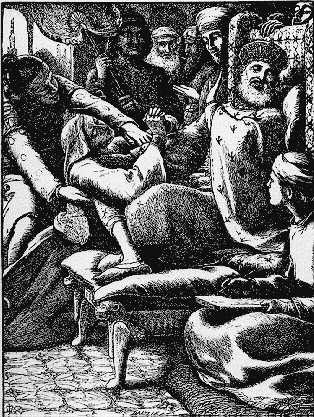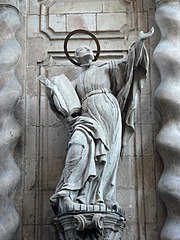The Lord Will Rescue Me. . .
30tth Sunday of the Year C (27Oct 2013)
Homily of Fr. Paul Panaretos, S.J.
Those words we heard from the Second Letter to Timothy offer us an entry to today’s scriptures and to the mystery we came to celebrate. Do we truly believe the Lord will rescue us? Answers revolve around the meaning of “believe.” For us it is no mere nod: I look out the window and see rain to believe it’s raining. For us people of faith believing is more than seeing. It is also more than minds agreeing the Lord desires to save us. “Do we truly believe” means: do we live from Jesus’ desire to save us? Does Jesus’ desire affect how we live, choose and respond to others?
.jpg/256px-Sun_peeking_through_the_leaves_(282155500).jpg) To believe the Lord will rescue us doesn’t mean we have everything figured out. It points to our bearing: we are mindful we are in God’s presence. God, present to us in everything, invites us closer. It is a mindful attitude: I am in God’s presence, God ever creating me and blessing me. That mindfulness offers serenity. Serenity centers us even in chaotic circumstances. This serenity registers as feeling accompanied in doubt and dismay as well as in joy and calm. Because it is God-given this serenity is grace. Grace is powerful and effective. Jesus’ familiar parable showed God’s life has power to change us who welcome it.
To believe the Lord will rescue us doesn’t mean we have everything figured out. It points to our bearing: we are mindful we are in God’s presence. God, present to us in everything, invites us closer. It is a mindful attitude: I am in God’s presence, God ever creating me and blessing me. That mindfulness offers serenity. Serenity centers us even in chaotic circumstances. This serenity registers as feeling accompanied in doubt and dismay as well as in joy and calm. Because it is God-given this serenity is grace. Grace is powerful and effective. Jesus’ familiar parable showed God’s life has power to change us who welcome it.
The characters of the parable, the tax-agent and the Pharisee, personify one who believes the Lord will rescue him and another who does not believe it. Who believed and who did not? Consider what believing means for people of faith: to believe the Lord will rescue us does not mean we have everything figured out. It means that in the calm and stress of living we are in God’s loving presence everywhere. The parable’s temple setting sharpens the question, Who welcomed God?
The Pharisee was smugly satisfied he was unlike others. He named three ways: greedy, dishonest and adulterous. Our experience tells us the Pharisee was mistaken. Who of us hasn’t felt greedy, dishonest or adulterous? We may have restrained ourselves from acting out those and other trespasses, but all of us have fought temptations and do; and we’ve given in to some.
The Pharisee exaggerated, too. He announced he fasted twice weekly and tithed. While tithing was encouraged and practiced, fasting twice a week wasn’t the norm. Mondays and Thursdays became Jewish fast days, but no one was obliged to fast on both. The Pharisee boasted he surpassed others. The tax-agent, though, made no claim at all! Nor did he give God a speech; he prayed. ‘O God, be merciful to me a sinner.’ He was honest.
To believe the Lord will rescue us means in the calm and stress of living we are in God’s loving presence. The Pharisee was in the temple, but he spoke [his] prayer to himself. And he had an eye on the tax-agent: ‘Not only am I not like the rest of humanity—greedy, dishonest, adulterous—[I’m not] even like this tax collector.’ To give God a speech while looking over his shoulder at whomever was in the temple is talent! It’s no prayer.
 The tax-agent did not presume to tell God anything. He only implored God’s mercy.The tax-agent, as his simple, profound prayer showed, believed the Lord would rescue him. The Pharisee’s speech showed something else: he trusted in his efforts. Its consequence was not to focus on God but on others at whom he sneered. That was Jesus’ intent: to point out those who were convinced of their own righteousness and [who] despised everyone else.
The tax-agent did not presume to tell God anything. He only implored God’s mercy.The tax-agent, as his simple, profound prayer showed, believed the Lord would rescue him. The Pharisee’s speech showed something else: he trusted in his efforts. Its consequence was not to focus on God but on others at whom he sneered. That was Jesus’ intent: to point out those who were convinced of their own righteousness and [who] despised everyone else.
Trusting our efforts, as if they were not God’s gifts to us from the first, is far from living from Jesus’ desire to save us. To trust in our efforts is a universal human temptation. For some people their efforts are their idols. Do we trust idols, or do we trust our triune God? Do we go before God to ask God save us and clothe us in God’s mercy? The Lord will not delay to show mercy to those who ask for it honestly. If you ask Jesus nothing else, ask him to deepen in you that conviction.
In your daily 15 minutes with Jesus this week
- Pause to bask in our triune God loving you.
- Ask the tax-agent to clothe you with his attitude and present you to Jesus.
- Chat with him: praise him for accompanying you even when you are not aware of his companionship; thank him for loving you patiently and faithfully and savor a few recent times you realize Jesus loved you patiently and faithfully.
- Ask for grace to converse frequently and honestly with him.
- Close saying slowly the Lord’s Prayer. His phrase, on earth as it is in heaven, reminds us our Christian belief is convinced that what we cannot see is more real than what we can see here and now.
________________________________________________________________
 Jesuit Jean-Baptiste Mazarati helps direct a biomedical research center in Rwanda. He is an alum of Georgetown University. He and others are “working to ensure its remaining residents receive the best health care possible.”
Jesuit Jean-Baptiste Mazarati helps direct a biomedical research center in Rwanda. He is an alum of Georgetown University. He and others are “working to ensure its remaining residents receive the best health care possible.”.jpg/256px-Sun_peeking_through_the_leaves_(282155500).jpg)








_-_James_Tissot_-_overall.jpg)



_-_James_Tissot_-_overall.jpg)




